Editor:
Brandon Sweet
University Communications
bulletin@uwaterloo.ca
Strengthening our Canada-France research collaboration
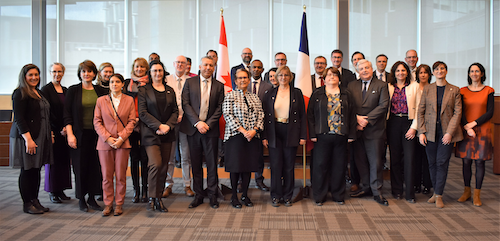
A long-term collaboration with academic partners across France has culminated in a Memorandum of Understanding between the University of Waterloo and the National Institute for Research in Digital Science and Technology (INRIA).
The MOU was signed by Charmaine Dean, vice-president, Research and International at the University of Waterloo and Cécile Vigouroux, director of International Relations at the National Institute for Research in Digital Science and Technology (INRIA). French Minister of Higher Education and Research Sylvie Retailleau and Ambassador Michel Miraillet were also in attendance.
“I am delighted that the University of Waterloo has signed a Memorandum of Understanding with L’Institut National De Recherche En Informatique Et En Automatique (INRIA),” Dean said. “We take immense pride in our international collaborations and the MOU we are signing today outlines a framework for further cooperation between INRIA and Waterloo in order to explore possibilities for collaboration on research activities.”
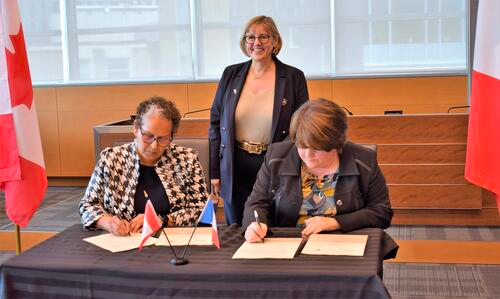
Waterloo has strategically partnered with the University of Bordeaux, also a partner of INRIA, for more than 10 years and has been growing relationships with research partners and institutions across France during the last decade. INRIA is an excellent partner for Waterloo and Canada given its focus on developing international collaborations and existing alignment with a number of French universities and mutual research interests in information and communications technologies (ICT), applied mathematics and computational modelling along with Artificial Intelligence, Cybersecurity, Quantum Computing, Human-Computer Interaction, Robotics, Networks and Security.
INRIA is a leading organization with similar values to Waterloo, and this partnership means Waterloo will also benefit from INRIA’s connection to the French National Centre for Scientific Research (CNRS) which is internationally recognized for excellence in scientific research.
The foundation for this partnership can be credited to Raouf Boutaba, professor and director of the Cheriton School of Computer Science, who recognized the benefits of collaborating and championing partnerships between researchers at Waterloo and French institutions.
Recently Waterloo Professor Edith Law and Professor Hélène Sauzéon at the University of Bordeaux were awarded funding to create an associate team at INRIA. The program supports bilateral scientific collaborations and promotes and strengthens the institute’s strategic partnerships with leading researchers abroad. The research consortium, titled Curiosity-driven Learning Across the Lifespan (CuriousTech) will be directed by Waterloo Professors Law and Myra Fernandes along with Professors Sauzéon and Pierre-Yves Oudeyer at the INRIA Centre at the University of Bordeaux.
“The research our international team will conduct will produce new understandings of the role of curiosity in education and health by designing and assessing new interactive educational technologies,” Law said. “Beyond academic contributions, we expect that the technologies we develop will help address broader societal challenges, such as educational equality in school and the needs of older adults with cognitive aging conditions.”
CuriousTech will build upon the findings and technologies developed from three previous INRIA-funded University of Bordeaux-University of Waterloo collaborative projects. CuriousTech’s goal is to create educational technologies that use curiosity as the key ingredient to meet the learning needs of individuals across all ages and cognitive abilities to enhance their health and well-being.
Waterloo is also one of the Canadian institutes that are part of the recently formed Canada-France Quantum Alliance (CAFQA) and Waterloo faculty members will be attending an inaugural workshop in May to participate in panel discussions.
The Living Sea - Fragile Beauty event takes place in May
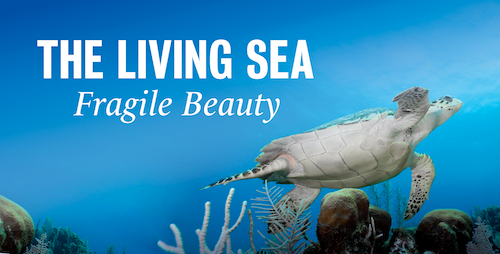
The University of Waterloo community is invited to a presentation by Prince Hussain Aga Khan featuring the work of his exhibition The Living Sea - Fragile Beauty at the Humanities Theatre on Tuesday, May 23.
The Living Sea – Fragile Beauty is an exhibition featuring the work of Prince Hussain Aga Khan, which celebrates the beauty and magic of the ocean. This exhibition also speaks to the devastating impact of plastic pollution and human activity, on marine life and the environment. The exhibition will be available for viewing at the Ismaili Centre Toronto from May 24 to June 4.
Following the presentation, Prince Hussain Aga Khan will join in conversation with Vivek Goel, President and Vice Chancellor. Guests will also enjoy special artistic performances.
A noted conservationist and wildlife photographer, Prince Hussain Aga Khan is the son of Aga Khan IV, the spiritual leader of Ismaili Muslims.
Registration is required for this free event, which takes place from 10:45 a.m. to 12:00 noon on Tuesday, May 23 in the Humanities Theatre. Check out the ticketfi page for more details.
A pedagogy of the streets

By Jon Parsons. Waterloo’s Centre for Teaching Excellence is hosting its annual conference on the theme of “teaching and learning with kindness and care.” Visit the conference website for more information on sessions and registration details.
Dr. Adam Ellis is developing radical approaches to teaching and learning.
“I grew up on the margins,” he says. “I was in a school system that wasn’t built for success, or was built for success for some people, and not others. I think the seed was planted for me to think about pedagogy way back then.”
In his work as a professor in the Department of Sociology and Legal Studies, Dr. Ellis is now practicing an approach to teaching and learning that aims to undo the very systems that pushed him to the margins, a liberatory pedagogy he is developing organically.
“Growing up in an environment and a system that had already labeled me a failure, I started to believe that higher education was never an option,” he continues. “I lost hope. That’s when I got involved in the streets and I got involved in gangs.”
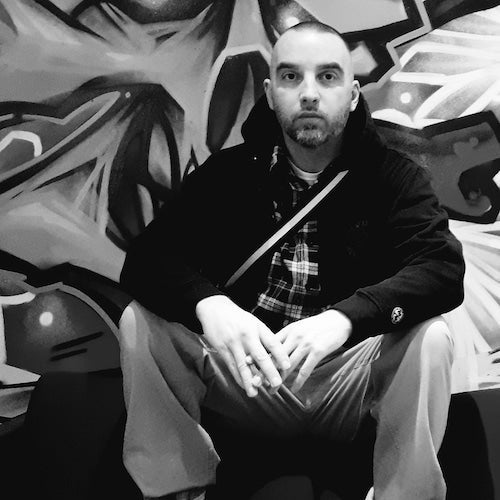
Dr. Adam Ellis, professor in the Department of Sociology and Legal Studies.
Ellis is currently teaching a criminology course focused on gangs and street culture. He has a forthcoming book that he co-edited called Thug Criminology: A Call to Action, to be published through University of Toronto Press. Ellis is the founder of The Street Institute, a research hub for critical scholars and community activists who have direct knowledge and experiences of life on the streets.
Lived experience is the teacher
“At that point, during high school when I was involved in the streets and gang life, it was a situation where my friends and I were socialized to the idea that life was a dead end, with death or jail being the only options,” he says. “It was a disaster. I reflect now and think, when I create classrooms, how can I create systems of care for students?”
Ellis opens his course by narrating his own lived experience of the streets. He describes his values as a teacher and how he intends to support the class.
Then, he organizes the students into their own fictional ‘gangs.’
“Alright, you’re no longer Jeremy, I say. Now you need a street name or an AKA. And this is your new group, and you all need to come up with a name for your gang. We go through a process of identity transformation, as if it was happening in the streets. That’s who they are for this semester, because I want them to start living, feeling and learning like they are the gang.”
As for assessment, Ellis looks to further the experience of the streets. Along with regular readings and weekly reflective writing, students engage in arts-based and ethnographic work. It may be the creation of murals and graffiti about systemic racism, police violence and death and loss. It may be developing hip hop or rap songs about street trauma. It may be creating clothing or styles. In this sense, students analyze the gang and street culture they are immersed in and are co-creating.
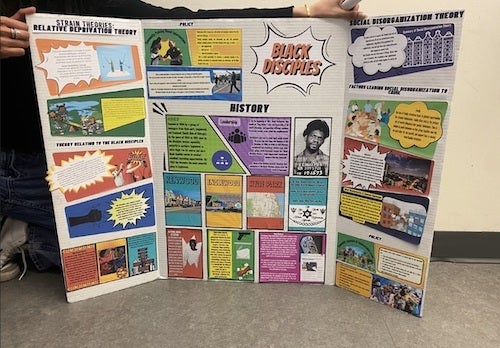
A student poster from the end-of-term course conference Ellis organizes in his class.
Ellis is keen to point out that the course isn’t an attempt to glamorize gang culture. Rather, the whole purpose is to challenge taken-for-granted notions of what gangs are, why people join them and the function they serve in marginalized communities.
“By the end of the term, the whole journey is to see the arc of a person’s life and tell a story of a young person and why they wanted to join a gang,” Ellis says.
Pedagogical echoes
While he is committed to developing his teaching practice, it’s not something he has been specifically trained in. In fact, Ellis’ pedagogy flows from his desire to open education to people who grew up like him, so that anyone could have a successful educational experience.
He says he is doing his best to integrate Indigenous approaches to decolonizing pedagogy, and says his work with Jessica Rumboldt, an educational developer specializing in Indigenous knowledges at Waterloo’s Centre for Teaching Excellence, has been highly influential.
Ellis’ teaching practice also has echoes of some of the best-known liberatory pedagogues: Paulo Freire’s pedagogy of the oppressed, Augusto Boal’s aesthetics of the oppressed and bell hooks’ pedagogy of hope, to name a few.
In the Canadian teaching and learning context, it is easy to see in Ellis’ work various elements of Max van Manen’s famous work on the tact of teaching and Carl Leggo’s contributions to artography.
Yet for all the synergies, Ellis develops his own teaching practice organically.
“I don’t study pedagogy,” he says. “Not that I’m not interested, and I am starting to learn more about pedagogy, but I just know what in my mind would have worked for my community and the people I was around to get them excited about education.”
“I’m looking at how I can get students to engage with the arts, especially urban arts, to start thinking about rewriting history, engaging in allyship and to learn how to empower themselves and tell their own stories.”
Ellis and Rumboldt are set to present a session, “Toward an urban arts pedagogy,” at the upcoming University of Waterloo Teaching and Learning Conference.
Ask not for whom the fire bell tolls and other notes
The Safety Office reports that fire drills will be held across campus next week, so keep your ears open and review your safe evacuation procedures as you wait for the inevitable bell to ring.

Today, the Waterloo Climate Institute is pleased to present "Understanding Canada’s National Adaptation Strategy". A lineup of expert panelists will discuss their perspectives on the Strategy at today's event, which will be held from 2:00 p.m. to 3:30 p.m.
Just what is Canada's National Adaptation Strategy, you might ask? On November 24, 2022, the Government of Canada released Canada’s National Adaptation Strategy: Building Resilient Communities and a Strong Economy. The Strategy is a result of extensive engagement since 2021 and presents a shared vision for climate resilience in Canada and a framework to measure progress nationally.
The virtual panel will be moderated by Ryan Ness, Director of Adaptation at the Canadian Climate Institute, with panelists Dr. Sarah Burch, Dr. Sherilee Harper (University of Alberta), Joanna Eyquem (Intact Centre on Climate Change Adaptation), and Graeme Reed (Assembly of First Nations).
Register for the event on Zoom.

This is a reminder that the Canada Biomedical Research Fund and Biosciences Research Infrastructure Fund (CBRF-BRIF) Call for Expressions of Interest has its deadline today.
Researchers are invited to apply for the Canada Biomedical Research Fund and Biosciences Research Infrastructure Fund (CBRF-BRIF). The purpose of these funds is to build on existing assets and infrastructure, forge partnerships across multiple sectors, including industry and government research facilities, and ensure Canada is prepared for future pandemics by increasing domestic capacity through investments and partnerships to produce life-saving vaccines and therapeutics.
Link of the day

When and Where
Fitness and Personal Training - Registrations opened January 5 this winter with Personal Training and Small Group Training as well as a Free Warrior Workout Program.
Waterloo Warriors Youth Camps. Spring and Summer camps available for Boys and Girls ages 5-18. Baseball, Basketball, Football, Volleyball, Hockey and Multi-Sport and Games. Register today.
Student Health Pharmacy in the basement of the Student Life Centre is now offering Covid booster shots (Pfizer and Moderna) and flu shots. Call 519-746-4500 or extension 33784 for an appointment. Walk-ins always welcome.
Final examination period,Thursday, April 13 to Friday, April 28.
Call for Expressions of Interest: Canada Biomedical Research Fund and Biosciences Research Infrastructure Fund (CBRF-BRIF), due Thursday, April 27. Learn more about the process.
Share how you experience the UWaterloo campus in the Inclusive Physical Space Framework survey for a chance to win a $50.00 on a WatCard. Survey closes midnight on Friday, April 28. Please note the deadline extension.
Ethnicity and Ethnic Constructs in the Long History of the Ancient Mediterranean and Black Sea, Wednesday, April 27 and Thursday, April 27, German Reading Room (ML 245).
Understanding Canada’s National Adaptation Strategy, Thursday, April, 27, 2:00 p.m., virtual (Zoom).
When and Where to get support
Students can visit the Student Success Office online for supports including academic development, international student resources, immigration consulting, leadership development, exchange and study abroad, and opportunities to get involved.
Instructors looking for targeted support for developing online components for blended learning courses, transitioning remote to fully online courses, revising current online courses, and more please visit Agile Development | Centre for Extended Learning | University of Waterloo (uwaterloo.ca).
Faculty, staff, post-doc and graduate student instructors can find upcoming teaching and learning workshops, self-directed modules and recordings of previous events on Centre for Teaching Excellence Workshops and Events page.
Instructors can access the EdTech Hub to find support on Waterloo’s centrally supported EdTech tools. The Hub is supported by members of IST’s Instructional Technologies and Media Services, Centre for Teaching Excellence, Centre for Extended Learning and subject matter experts from other campus areas.
Supports are available for employees returning to campus. Visit IST’s Hybrid Work and Technology guidelines and workplace protocols to assist with the transition.
Employees who need support can contact occupationalhealth@uwaterloo.ca. Occupational Health can provide support related to medical leave, workplace accommodations and anything else related to your health and wellbeing. For professional support or counselling, contact our Employee & Family Assistance provider (EFAP) Homewood Health at 1-800-663-1142. They are available 24/7 for urgent or non-urgent matters. Their website also offers helpful resources.
Students with permanent, temporary and suspected disabilities and disabling conditions (medical conditions, injuries, or trauma from discrimination, violence, or oppression) can register with AccessAbility Services for academic accommodations (classroom accommodations, testing accommodations, milestone accommodations).
Instructors can visit AccessAbility Services' Faculty and Staff web page for information about the Instructor/Faculty role in the accommodation process. Instructors/Faculty members are legally required to accommodate students with disabilities. AccessAbility Services (AAS) is here to help you understand your obligations, and to offer services and resources to help you facilitate accommodations.
Did you know that the Writing and Communication Centre offers many in-person and virtual services to support you with any writing or communication project? This term we've added The Write Spot: a new student space in South Campus hall, complete with bookable workspaces, drop-ins with our peer tutors, and free coffee and tea. We also have one-to-one appointments with our writing and communication advisors and peer tutors, email tutoring for grads and undergrads, drop-ins at Dana Porter Library, online workshops, writing groups, English conversation practice, and even custom in-class workshops. For any communication project, the Writing and Communication Centre is here to support you.
Research Ethics: Find yourself with an ethical question, unsure if your work requires an ethics review, or need advice about putting together a research ethics application? Reach out to one of our friendly staff by booking a consultation or email us with your questions.
Co-op students can get help finding a job and find supports to successfully work remotely, develop new skills, access wellness and career information, and contact a co-op or career advisor.
The Centre for Career Action (CCA) has services and programs to support undergrads, grad students, postdocs, alumni, and employees in figuring out what they value, what they’re good at, and how to access meaningful work, co-op, volunteer, or graduate/professional school opportunities. Questions about CCA's services? Live chat, call 519-888-4047, or stop by our front desk in the Tatham Centre 8:30 a.m. to 4:30 p.m., Monday to Friday.
Drop-in to in-person Warrior Study Halls on Thursdays from 5:00 p.m. to 6:30 p.m. in DC and DP. Join a Peer Success Coach to set goals and work independently or in groups each week.
Renison's English Language Institute continues to offer virtual events and workshops to help students practice their English language skills.
If you feel overwhelmed or anxious and need to talk to somebody, please contact the University’s Campus Wellness services, either Health Services or Counselling Services. You can also contact the University's Centre for Mental Health Research and Treatment. Good2Talk is a post-secondary student helpline available to all students.
The Library is here to help, both in person and online. Our spaces are open for access to book stacks, study spaces, computers/printers, and the IST Help Desk. For in-depth support, meet one-to-one with Librarians, Special Collections & Archives and Geospatial Centre staff. Visit the Library’s home page to access our online resources for anywhere, anytime learning and research.
The Faculty Association of the University of Waterloo (FAUW) continues to advocate for its members. Check out the FAUW blog for more information.
The University of Waterloo Staff Association (UWSA) continues to advocate for its members. Check out the UWSA blog for more information.
The Office of Equity, Diversity, Inclusion & Anti-racism (EDI-R) works with students, faculty and staff across campus to advance equity and anti-racism through evidence-based policies, practices and programs. If you have a concern related to anti-racism and/or equity, please complete our intake form.
The Sexual Violence Prevention and Response Office (SVPRO) supports all members of the University of Waterloo campus community who have experienced, or been impacted, by sexual violence. This includes all students, staff, faculty and visitors on the main campus, the satellite campuses, and at the affiliated and federated Waterloo Institutes and Colleges. For support, email: svpro@uwaterloo.ca or visit the SVPRO website.
The Office of Indigenous Relations is a central hub that provides guidance, support, and resources to all Indigenous and non-Indigenous campus community members and oversees the University's Indigenization strategy.
The Waterloo Indigenous Student Centre, based at United College, provides support and resources for Indigenous students, and educational outreach programs for the broader community, including lectures, and events.
WUSA supports for students:
Peer support - MATES, Glow Centre, RAISE, Women’s Centre - Click on one of the links to book an appointment either in person or online for the term.
Food Support Service food hampers are currently available from the Turnkey Desk 24/7 in the Student Life Centre. Drop-off locations are also open again in SLC, DC, DP, SCH, and all residences.
Co-op Connection all available online.
Centre for Academic Policy Support - CAPS is here to assist Waterloo undergraduates throughout their experience in navigating academic policy in the instances of filing petitions, grievances and appeals. Please contact them at caps@wusa.ca.
WUSA Student Legal Protection Program - Seeking legal counsel can be intimidating, especially if it’s your first time facing a legal issue. The legal assistance helpline provides quick access to legal advice in any area of law, including criminal. Just call 1-833-202-4571.
Empower Me is a confidential mental health and wellness service that connects students with qualified counsellors 24/7. They can be reached at 1-833-628-5589.
GSA-UW supports for graduate students:
The Graduate Student Association (GSA-UW) supports students’ academic and social experience and promotes their well-being.
Advising and Support - The GSA advises graduate students experiencing challenges and can help with navigating university policies & filing a grievance, appeal, or petition.
Mental Health covered by the Health Plan - The GSA Health Plan now has an 80 per cent coverage rate (up to $800/year) for Mental Health Practitioners. Your plan includes coverage for psychologists, registered social workers, psychotherapists, and clinical counselors.
Dental Care - The GSA Dental Plan covers 60 to 70 per cent of your dental costs and by visiting dental professionals who are members of the Studentcare Networks, you can receive an additional 20 to 30 per cent coverage.
Student Legal Protection Program - Your GSA fees give you access to unlimited legal advice, accessible via a toll-free helpline: +1-833-202-4571. This advice covers topics including housing disputes, employment disputes, and disputes with an academic institution.
The Graduate House: Open Monday to Tuesday 11:30 a.m. to 7:00 p.m. and Wednesday to Friday 11:30 a.m. to 9:00 p.m. We’re open to all students, faculty, staff, and community members. The Graduate House is a community space run by the GSA-UW. We’re adding new items to the menu. Graduate students who paid their fees can get discounts and free coffee.
PhD oral defences
Electrical & Computer Engineering. Amir Amini, "On Nonlinear Time-Invariant Behavioural Models of Power Transistors Used in the Computer-Aided Design of Power Amplifiers." Supervisor, Dr. Slim Boumaiza. On display in the Engineering Graduate Office, E7 7402. Oral defence Thursday, April 27, 1:30 p.m., EIT 3151-53 and remote.
Geography and Environmental Management. Andrea Minano, “Evaluating flood risk governance with geospatial technologies”. Supervisor, Dr. Dan Scott. Available upon request from the Faculty of Environment, Administrator, Graduate Studies. Oral defence Thursday, April 27, 1:00 p.m.
Environment, Resources and Sustainability. Kira Cooper, “An Exploration of the Nexus Between Inner and Outer Sustainability”. Supervisor, Robert Gibson. Available upon request from the Faculty of Environment, Administrator, Graduate Studies. Oral defence Friday, April 28, 12:00 noon.
Physics and Astronomy. Erickson Tjoa, “The Roles of Causal Propagator in Relativistic Quantum Information.” Supervisors, Dr. Robert Mann, Dr. Eduardo Martin-Martinez. Please visit the Faculty of Science Thesis Submission Notices website for details on requesting a copy. Oral defence Tuesday, May 2, 9:30 a.m., PHY 352 and remote.
Physics and Astronomy. Kristi Webb, “Tracing galaxy evolution through the reconstruction of their star formation histories.” Supervisor, Dr. Michael Balogh. Please visit the Faculty of Science Thesis Submission Notices website for details on requesting a copy. Oral defence Thursday, May 4, 2:00 p.m., PHY 352.